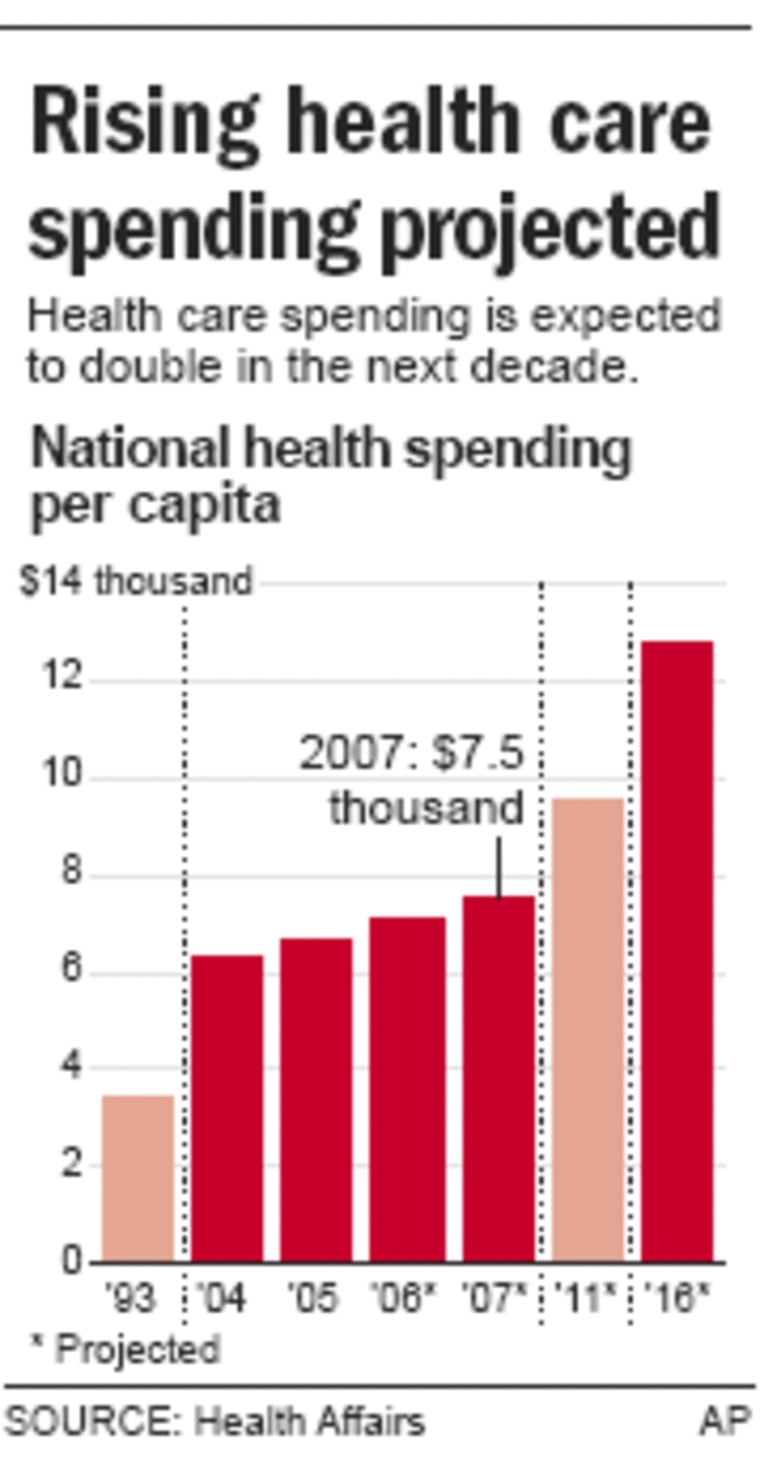Democrats looking for money to pay for health care priorities renewed their focus on insurers Thursday.
A commission that advises Congress told lawmakers that Medicare spends about 12 percent more for care administered through private insurers than when the same care is provided through traditional Medicare.
The commission recommended eliminating that gap, which would save about $65 billion over five years, according to the Congressional Budget Office.
Commission's roadmap
Democrats are looking to expand a program that offers health insurance to poor children. They will also need to find a way to avoid cutting payments to doctors, which are scheduled to drop by about 10 percent next year.
The commission is nonpartisan, but its report gives the Democrats a road map for where they might find some of the money.
Rep. Frank Pallone, chairman of the House Energy and Commerce subcommittee on health, said the report confirms his belief that the private insurers are overpaid. Pallone, D-N.J., said he wants to steer those overpayments into other health programs.
"The reason they were paid that extra amount is because of their relationship with the Republicans," Pallone said. "It's a special-interest advantage that was given to them because of their relationship with the Republican majority. There's no other rationale for it."
The chairman of the Senate Finance Committee, Sen. Max Baucus, D-Mont., has said he would look at payments to insurers for possible savings. "The report confirms that it's a place we need to look," said Carol Guthrie, his spokeswoman.
Republicans were prepared for the Medicare Payment Advisory Commission's recommendation, which mirrored a recommendation it made two years ago. But this time, Democrats are more inclined to go along with the recommendation than Republicans were.
Cuting payments of elderly and disabled
The private insurance component of Medicare, known as Medicare Advantage, "is fast becoming the proverbial low-hanging fruit. As someone who has represented fruit growers let me warn you: low-hanging fruit tends to be the least ripe and the most sour," Rep. Dave Camp said during a congressional hearing Thursday.

Camp, R-Mich., said cutting the payments means older people and the disabled would lose benefits that are now subsidized by the federal government. In other cases, Medicare participants in rural areas would not have any access to a managed care program.
Karen Ignagni, president and chief executive of the trade group representing insurers, said payment cuts could jeopardize free cancer screenings or dental care and cause monthly premiums to rise. She said about 8 million of the 43 million Medicare beneficiaries are in managed care programs, and that number is quickly growing.
"Congress shouldn't take away benefits for seniors who depend on this program," she said.
Reimbursement gap
Ignagni said the advisory commission exaggerated the gap in reimbursement rates for managed care versus reimbursement in traditional Medicare by more than 50 percent.
Under traditional Medicare, the government pays doctors, hospitals and other providers a set fee when they perform a particular service. Under managed care, insurers get a set amount per person. Then, the insurers reimburse the people who provide the care.
The commission recommendations are closely tracked by lawmakers, the Bush administration and by providers. The commission studies whether the government is paying too much or too little for care.
For example, the commission's report Thursday also said that Congress should not increase the reimbursement rates next year for nursing homes and home health care. That set off a flurry of letters and press releases from trade groups criticizing the recommendations.
Herb Kuhn, acting deputy administrator for the Centers for Medicare and Medicaid Services, said Congress set managed care payments at a rate that would quickly build up that part of the program.
Managed care, he said, encourages physicians from different specialties to coordinate their work, which is important for older people with chronic conditions.
"It's good care, it's additional benefits. It's a nice value being brought to Medicare beneficiaries," Kuhn said.
The advisory commission urged gradual changes in the pay structure so disruptions in care do not have "unintended consequences."
The commission also said it supports managed care, but questions the fairness in treating people differently based on their choice of managed care or traditional Medicare.